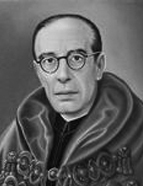

The early years of Merêa's academic and intellectual life were marked by significant upheaval in Portuguese political life. After beginning his law degree, he witnessed João Franco's dictatorship, the regicide, and the establishment of the Republic. In 1914, the year he began teaching at the Faculdade de Direito [Faculty of Law], the First World War erupted. He spent the turbulent years of the First Republic in Coimbra, starting as an assistant professor in the 1st group at the Faculty of Law and later progressing to regular professor in 1915. Between 1920 and 1924, he taught in the History group at the Faculty of Arts and Humanities of Coimbra as a provisional professor, at the invitation of António de Vasconcelos, the History of Portugal course. There, he inspired students such as Paulo Quintela, Sílvio Lima, Costa Pimpão, Torquato de Sousa Soares, and Vitorino Nemésio (Mello, G. S., “Paulo Merêa”, 2013, p. 65). In 1924, he returned to Lisbon to be closer to the Torre do Tombo, then returned to Coimbra in 1931, where he taught until 1948 (delivering his final lecture on 16 April of that year). Alongside his university career, Merêa was awarded honoris causa degrees by the Faculty of Arts and Humanities of the University of Coimbra and the Faculty of Law of the University of Compostela. He was also a member of several academies, including the Academia das Ciências de Lisboa [Lisbon Academy of Sciences], which he left to become a founding member of the Academia Portuguesa da História [Portuguese Academy of History], where he held chair no. 23 from 1945 to 1948. He was also a member of the Real Academia de la Historia in Madrid. After retiring from teaching early in 1948 due to health reasons, Paulo Merêa remained intellectually active, publishing an extensive body of work throughout the 1950s and 1960s. In 1972, he retired to Caramulo, where he died on 5 January 1977. Throughout his academic career, Merêa had several followers, so much so that some historians claimed to be "his followers without even having been his students" (Faria, M., “Doutor Manuel Paulo Merêa”, 1979, p. 3). Guilherme Braga da Cruz was his successor at the Coimbra Faculty of Law, continuing the work of Paulo Merêa but approaching it from a different perspective (Ourliac, P., “L’histoire du droit…”, 1982, p. 776).
This work is financed by national funds through FCT - Foundation for Science and Technology, I.P, in the scope of the projects UIDB/04311/2020 and UIDP/04311/2020.
